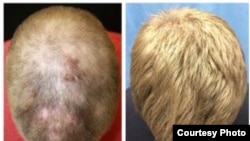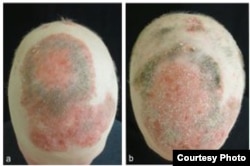The long sought after cure for some types baldness may have been discovered.
Researchers at Yale University School of Medicine report a case of a man who had virtually no hair on his entire body, a disease called alopecia universalis, growing a complete head of hair after receiving a treatment for plaque psoriasis, a common skin disease.
According to a news release, the 25-year-old only had hair on the scaly red areas of psoriasis on his head. He was treated with tofacitinib citrate, commonly used to battle rheumatoid arthritis but also used to fight psoriasis. The drug caused the patient to grow hair not only on his head, but eyebrows, eyelashes, armpit hair and other hair.
The drug had proved effective in reversing alopecia areata, which is a less severe form of alopecia, in mice.
“The results are exactly what we hoped for,” said Dr. Brett A. King, assistant professor of dermatology at Yale University School of Medicinein a statement. “This is a huge step forward in the treatment of patients with this condition. While it’s one case, we anticipated the successful treatment of this man based on our current understanding of the disease and the drug. We believe the same results will be duplicated in other patients, and we plan to try.”
According to King, the drug caused hair growth by “turning off the immune system attack on hair follicles that is prompted by the disease.”
The patient had “full regrowth of hair” and reported no side effects, according to researchers.
While the drug caused hair growth, it was only “mildly effective” in treating the psoriasis.
Gary Sherwood, a spokesman for the National Alopecia Areata Foundation wrote in an email that he was “encouraged” by the Yale results.
“While we remain hopeful, we wish to remind the alopecia areata community this is a preliminary study with the effects of the drug studied on only one individual,” he added. “It should be considered preliminary and not validated at this point, and remains to be further studied in clinical trials.”
He urged Yale to pursue a clinical trial and said he was “excited” for a clinical trial of the drug scheduled to start at Columbia University later this summer.
King hopes to perform a clinical trial of a cream form of tofacitinib as a treatment for alopecia areata.
King’s paper, entitled “Killing Two Birds with One Stone: Oral Tofacitinib Reverses Alopecia Universalis in a Patient with Plaque Psoriasis” appeared online in the Journal of Investigative Dermatology.
Researchers at Yale University School of Medicine report a case of a man who had virtually no hair on his entire body, a disease called alopecia universalis, growing a complete head of hair after receiving a treatment for plaque psoriasis, a common skin disease.
According to a news release, the 25-year-old only had hair on the scaly red areas of psoriasis on his head. He was treated with tofacitinib citrate, commonly used to battle rheumatoid arthritis but also used to fight psoriasis. The drug caused the patient to grow hair not only on his head, but eyebrows, eyelashes, armpit hair and other hair.
The drug had proved effective in reversing alopecia areata, which is a less severe form of alopecia, in mice.
“The results are exactly what we hoped for,” said Dr. Brett A. King, assistant professor of dermatology at Yale University School of Medicinein a statement. “This is a huge step forward in the treatment of patients with this condition. While it’s one case, we anticipated the successful treatment of this man based on our current understanding of the disease and the drug. We believe the same results will be duplicated in other patients, and we plan to try.”
According to King, the drug caused hair growth by “turning off the immune system attack on hair follicles that is prompted by the disease.”
The patient had “full regrowth of hair” and reported no side effects, according to researchers.
While the drug caused hair growth, it was only “mildly effective” in treating the psoriasis.
Gary Sherwood, a spokesman for the National Alopecia Areata Foundation wrote in an email that he was “encouraged” by the Yale results.
“While we remain hopeful, we wish to remind the alopecia areata community this is a preliminary study with the effects of the drug studied on only one individual,” he added. “It should be considered preliminary and not validated at this point, and remains to be further studied in clinical trials.”
He urged Yale to pursue a clinical trial and said he was “excited” for a clinical trial of the drug scheduled to start at Columbia University later this summer.
King hopes to perform a clinical trial of a cream form of tofacitinib as a treatment for alopecia areata.
King’s paper, entitled “Killing Two Birds with One Stone: Oral Tofacitinib Reverses Alopecia Universalis in a Patient with Plaque Psoriasis” appeared online in the Journal of Investigative Dermatology.





